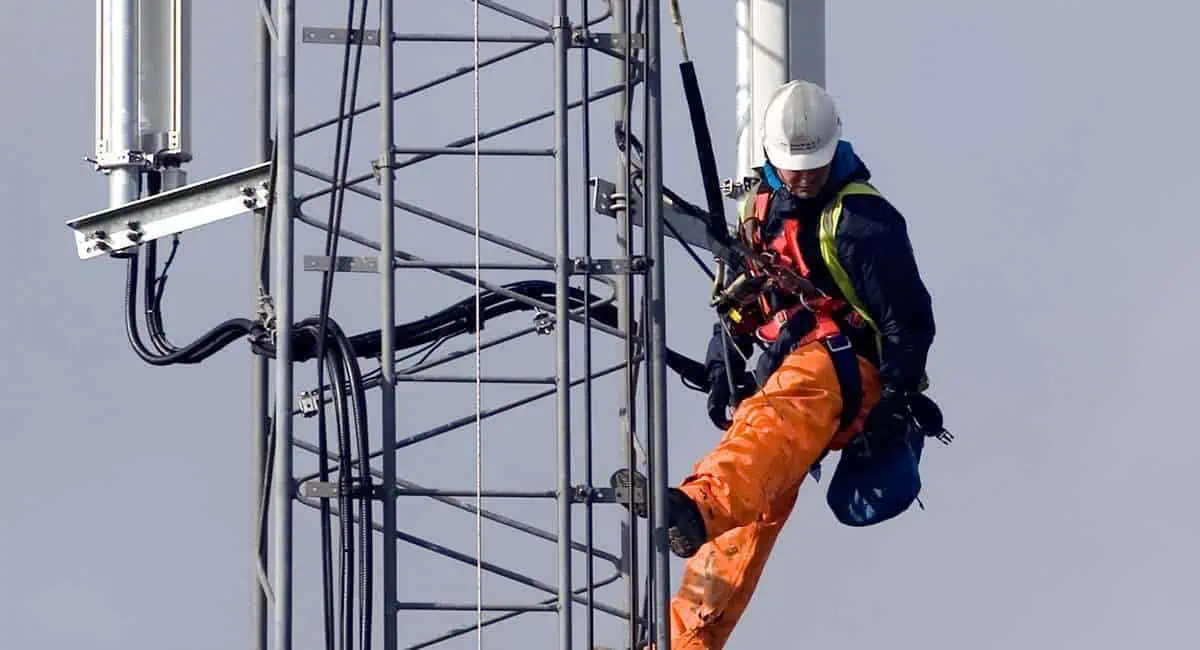Tower Climbing: A Career Path Worth Considering
Tower climbing is a challenging and rewarding career path that offers great opportunities for growth and advancement. Learn more about this exciting field here!

Tower climbing is an incredibly extraordinary and exhilarating vocation encompassing the vertiginous ascension of lofty edifices to execute meticulous upkeep, repairs, and installations. This profoundly demanding profession necessitates robust physical prowess, exceptional technical aptitude, and an unwavering dedication to ensuring safety. Within this expository piece, we shall delve into the realm of these audacious climbers of towers and the myriad prospects that abound within this burgeoning industry.
What is tower climbing?
The realm of tower climbing is an intricately specialized domain encompassing the art of ascending towering structures, including cellular towers, broadcast towers, and wind turbines, to execute maintenance, repairs, and installations. Tower climbers employ highly specialized equipment and techniques to securely ascend and descend these structures, often operating at considerable heights and facing formidable weather conditions. Pursuing this career path demands unwavering dedication to safety, physical fitness, and technical proficiency.
Tower climbers are pivotal in preserving and augmenting our contemporary communication and energy infrastructure. They are responsible for installing and upholding antennas, cables, and other apparatuses on towers, conducting meticulous inspections, and effecting necessary repairs. This arduous labor entails ascending hundreds of feet into the atmosphere, often enduring the harshest weather. Consequently, tower climbers must exhibit expertise in handling specialized equipment, such as harnesses, ropes, and safety gear, ensuring their well-being while operating at dizzy heights. Moreover, they must be able to troubleshoot intricate technical issues and foster collaboration with fellow team members, thus facilitating project timely and cost-effective completion. Despite the various challenges inherent in this occupation, many tower climbers derive immense satisfaction from their work, as they occupy a pivotal role in sustaining our society's interconnectedness and power supply.
What are the job responsibilities of a tower climber?
The pursuit of tower climbing necessitates a distinctive array of proficiencies and credentials. Primarily, climbers must possess exceptional physical aptitude and exhibit comfort while operating at great heights. They must also demonstrate technical expertise encompassing electrical and mechanical systems and a comprehensive understanding of safety regulations and procedures. Numerous employers mandate a high school diploma or equivalent; some may even necessitate supplementary certifications or training in areas like tower rescue or first aid. Proficiency in communication and the ability to collaborate effectively within a team is equally pivotal for achieving success in this domain.
Tower climbers must exhibit adaptability to work under any weather conditions and be prepared to endure prolonged working hours, often in remote and secluded locations. In addition, they must dutifully adhere to stringent safety protocols and possess the ability to respond to emergent circumstances promptly. Climbers must also possess unwavering attention to detail and demonstrate rapid and efficient troubleshooting skills. Furthermore, they must be adept at employing various tools and equipment, including harnesses, ropes, and safety gear. Overall, the vocation of tower climbing demands a distinctive amalgamation of physical, technical, and interpersonal proficiencies, presenting a challenging yet fulfilling career choice for those who rise to the challenge.
What are the potential risks and safety measures in tower climbing?
Tower climbing is dangerous, necessitating the utmost adherence to stringent safety protocols. Climbers must don suitable personal protective equipment (PPE), including harnesses, helmets, and safety glasses. They must also possess expertise in correct climbing methodologies and emergency rescue procedures to address unforeseen contingencies. Further potential hazards encompass exposure to inclement weather phenomena, electrical perils, and the peril of objects falling from above. Employers bear the onus of furnishing a secure working environment, ensuring the observance of all safety measures.
The endeavor of tower climbing entails a gamut of plausible hazards. The risk of plummeting from considerable heights looms among these perils, with grievous harm or fatality as possible consequences. To avert such falls, climbers must unfailingly wear a securely fastened harness connected to the tower. Additionally, they must undergo training in proper climbing techniques, such as maintaining three points of contact with the structure at all times.
In tandem with the danger of falls, tower climbers might also contend with the vicissitudes of severe weather conditions, encompassing gale-force winds, lightning, and extreme temperatures. So, to mitigate these risks, climbers must receive instruction on performing their duties safely in these environments and be equipped with suitable protective gear, including insulated clothing and gloves.

What are the career opportunities and growth prospects in tower climbing?
The vocation of tower climbing presents an array of expansive prospects for career development and advancement. Aspiring climbers can commence their journey as apprentices and steadily ascend the ranks to become seasoned technicians or supervisors. Furthermore, they can specialize in distinct areas such as antenna installation, tower maintenance, or tower inspection. By pursuing further training and securing certification, climbers can ascend to more lucrative positions, such as project managers or safety directors. The demand for individuals proficient in tower climbing will escalate in the forthcoming years, rendering it a promising career trajectory for those prepared to exert themselves and embrace the diverse challenges inherent in the occupation.
Tower climbing is an occupation that exacts a formidable toll on the physique, necessitating a superior skill level and an unwavering commitment to precision. Nevertheless, the rewards can be considerable for those undaunted by the demands. Climbers can anticipate receiving competitive remuneration, augmented by the potential for additional compensation in the form of overtime pay and bonuses. Moreover, they are allowed to embark on voyages and engage in projects spanning the entire nation, affording them a splendid opportunity to explore novel locales and accrue invaluable expertise.
What is the Pay of Tower Climber?
The compensation package for tower climbers is subject to significant variation due to the intricate nature of their job. Tower climbing, while physically demanding and fraught with peril, presents an opportunity for substantial remuneration. The pivotal role of tower climbers encompasses the installation, maintenance, and rectification of cellular infrastructure, which forms the bedrock of our contemporary communication framework.
The pecuniary recompense for tower climbers fluctuates according to several key factors, namely their experience, geographical location, and the corporate entity with which they are affiliated. As per the authoritative figures provided by the Bureau of Labor Statistics, the median annual salary for tower climbers stood at an estimated $49,510 in 2020. A fraction constituting the lowest 10% of tower climbers earned an amount below $32,150, while the upper echelon comprising the highest 10% garnered an impressive sum surpassing $74,350.
Typically, tower climbers procure an hourly wage between $20 and $30. However, it is noteworthy that seasoned practitioners with specialized proficiencies may command an hourly rate exceeding $40, augmenting their earning potential.
Various factors can influence the financial remuneration bestowed upon a tower climber. Foremost among these factors is the level of experience, as individuals endowed with a greater wealth of practical knowledge and expertise tend to amass superior compensation compared to their less seasoned counterparts. Moreover, the geographical location wherein a tower climber plies their trade plays a pivotal role in determining their compensation, with urban settings often affording higher earning prospects than their rural counterparts. Additionally, the employing company holds sway over the remuneration package, with some entities demonstrating a propensity for more generous compensation than others.
Cell Tower Climber Job Responsibilities
The job responsibilities of a tower climber vary depending on the company they work for and the type of towers they work on. However, some common job responsibilities include:
- Climbing cell towers to install, maintain, and repair equipment
- Inspecting cell towers for safety and structural integrity
- Operating heavy machinery, such as cranes and lifts
- Working in a variety of weather conditions
- Following safety procedures
Tower Climber Skills
The proficiencies requisite for ascending towers diverge correspondingly to the employing organization and the genre of towers involved. Nevertheless, certain shared proficiencies encompass:
- Astute physical fitness
- Superior hand-eye coordination
- Robust work ethic
- Meticulous attention to detail
- Aptitude to operate autonomously and collaboratively
- Proficiency in adhering to safety protocols
If you are contemplating a vocation as a tower climber, there are several measures you can undertake to ready yourself:
- Acquire a high school diploma or its equivalent.
- Pursue coursework in mathematics, science, and electronics.
- Obtain certification in tower safety.
- Garner practical experience in working at elevated heights and handling heavy machinery.
- Establish connections within the tower climbing industry.
Tower climbing embodies a formidable yet fulfilling profession. If you seek an occupation that demands physical exertion, intellectual stimulation, and offers lucrative compensation, then tower climbing may prove to be a fitting career choice.
Conclusion
In conclusion, embarking on a professional journey as a tower climber presents a promising trajectory brimming with numerous advantages: substantial remuneration, unwavering occupational stability, and the opportunity to toil in the great outdoors. Nonetheless, it is important to acknowledge that tower climbing constitutes an occupation fraught with peril, necessitating profound expertise and comprehensive training. Suppose you are contemplating the pursuit of a career in this domain. In that case, it is imperative to diligently conduct thorough research and ensure you are adequately equipped to confront the difficulties inherent in this line of work.
Herein lie supplementary elucidations about the merits entailed in a tower climbing vocation:
- Lucrative compensation: Tower climbers garner a median annual salary of $50,000, surpassing the national median salary of $31,000 by a significant margin.
- Unwavering job security: The demand for tower climbers is anticipated to burgeon in forthcoming years due to the escalating requirement for telecommunications infrastructure and related facilities.
- Opportunity to embrace the great outdoors: Tower climbers relish operating within picturesque and secluded locales dispersed throughout the nation.
Nevertheless, it is paramount to recognize the perils endemic to the tower climbing profession. Tower climbers are invariably exposed to dizzy heights, electrical hazards, and additional risks. Suppose you are contemplating the pursuit of a career in tower climbing. In that case, it is crucial to engage in comprehensive due diligence and ensure that you are sufficiently prepared to surmount the challenges intrinsic to this line of work.
Provided below are supplementary intricacies concerning the hazards associated with a tower climbing occupation:
- Elevated altitudes: Tower climbers operate at altitudes soaring up to 1,000 feet, constituting an inherently hazardous environment fraught with the constant peril of falling.
- Electrical hazards: Tower climbers navigate the intricacies of high-voltage electrical lines, an environment brimming with inherent danger and the perpetual risk of electrocution.
- Additional risks: Tower climbers are likewise exposed to an array of other hazards, encompassing inclement weather conditions, confined spaces, and the rigors of heavy lifting.
Should you contemplate embarking on a tower climbing career, it is imperative to evaluate the risks against the benefits meticulously. While tower climbing can yield gratifying professional prospects, it remains indispensable to be aware of the potential hazards.



